New generation of the GameStudio game development suite. A8 brings enet for better network performance, Nvidia Physx for more stable physics and more physics functions, instancing and gpu accerelated bone animations for better performance and much more.
Morals, Ethics and Spirituality in Video Games
by Michael Klaus Schmidt
As a person who has played video games for a long time, I have noticed certain trends come and go, and occasionally return, when it comes to game design. One such trend is the inclusion or reference to morality, ethics and in some cases spiritual and religious traditions in games.
I will go through a short history of this topic by presenting a few specific games and describing how they may have influenced game design. The list will not be comprehensive at all, but will simply highlight a few moments that I felt were significant. I'll be writing mostly from memory, so forgive me if I miss something you think is important.
Some readers may be surprised to hear that video games, which are occasionally represented as glorifying violence, and other negative stereotypes, would have any kind of morality at all. However, for many who play games these kinds of choices have played a huge role in our enjoyment and appreciation of games and the interactive stories they tell.
In fact, games are uniquely suited to be able to convey the importance of moral questions. A book may present a moral question and show the impact of a character's good or bad choices. However, only in video games will the player be able to actually make those choices and experience the consequences through their character.
So while it is true that many games do offer violence and other anti-social behaviors as a way to have fun, there has been, since the very early days of video games, a counter trend that questions this approach and offers players a more complex experience where their choices matter and have lasting consequences on the virtual world they inhabit.
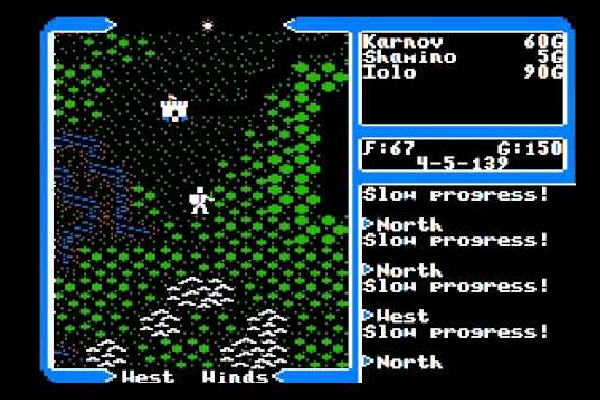
Ultima V
My first encounter with a complex moral system in games came when I played Ultima V: Warriors of Destiny. This game by veteran game designer Richard Garriot (Lord British) was the fifth installment in the Ultima Series (or sixth I guess if you count Akelabeth). He himself noted that in the earlier games, he felt concerned about rewarding players for committing actions that would be considered wrong or evil. In Ultima IV (a game I did not actually play) he introduced a system of virtues, and asked the player to choose a set of virtues to live by in the game world. Ultima V continued this tradition.
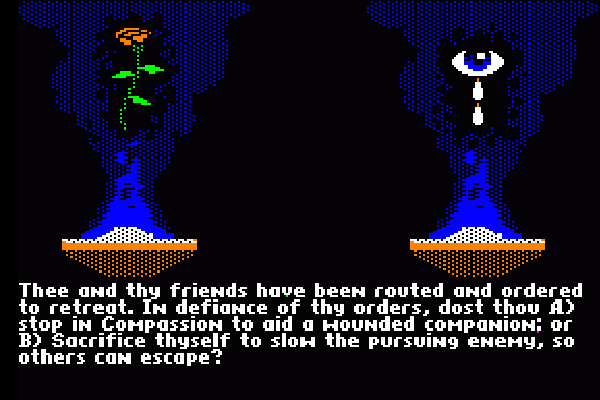
Within the many quests and tasks the player advances through, there were planted a number of tests, to see if the player was living up to the moral standard they were supposed to be upholding. The game presents the following virtues as important concepts that should directly influence player choices. Honesty, Compassion, Valor, Justice, Sacrifice, Honor, Spirituality and Humility are all mentioned. I remember playing this game and feeling compelled to read up on the concept of these virtues, talking with my friends about them and making them a part of my thought process.
Ultima V also presents another layer of morality, which is when the virtues themselves become laws, and those laws become corrupted and extreme. The player must return (as the avatar who actually established those very virtues in Ultima IV) and uncover the mystery that changed good into evil.
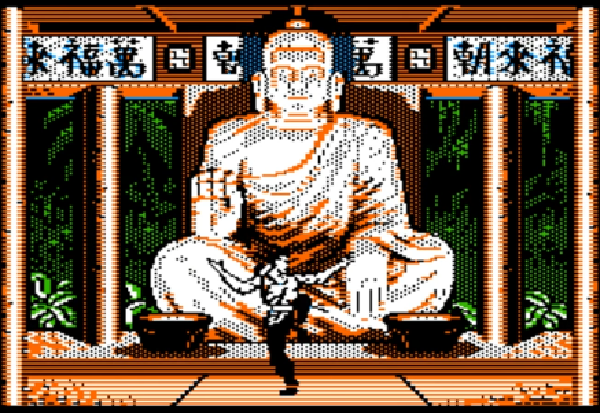
Moebius: The Windwalker
Not to be confused with The Legend of Zelda: The Wind Waker!
Moebius: The Windwalker was the sequel to Moebius: The Orb of Celestial Harmony and it appeared to be based on Buddhist spiritual traditions. Designed by Greg Malone and Origin Systems (which was founded by Ultima designer Richard Garriot above), I am mentioning the sequel here, not because I did not play the original (I did play it and loved it and still have the original disk), but because the Windwalker actually introduced Karma, and even the hereafter, as a game mechanic. I found it to be incredibly interesting to play a game that openly punished players for immoral behavior. I remember sneaking into an NPCs house and rifling through their cabinet for some stuff. This sounds awful, but this was the kind of behavior most games rewarded back then. In Windwalker, I was immediately surprised to see my Karma meter tick down when I grabbed something that was not mine.
Later, I remember speaking with an otherwise helpful NPC, but they did not seem to trust me anymore. I had to give back what I stole, burn some incense in the temple and cleanse myself through prayer in order to return to my good standing as hero. It may seem trivial now, but at the time this represented a whole new dimension in gameplay that blew my mind.
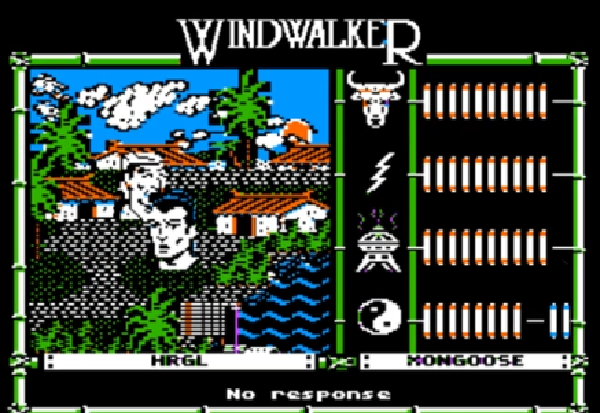
Honestly, I really felt like this game changed me as a person. Giving the player this kind of positive or negative feedback based on their actions can be incredibly powerful. My favorite bit was when your character dies and your soul must stand before the Mirror of Truth. Let me tell you, the Mirror of Truth is not an easy thing to face, even in a video game.
In addition to these key gameplay elements, Windwalker also had a really intriguing side quest. It involved visiting and joining a monastery, where the player would live as a monk for a period of time. I found this sequence to be totally counter intuitive to anything I'd seen in video gaming, and even role playing games in general. Living as a monk involved following a strict schedule of prayer, writing scripture, cleaning and other somewhat mundane, yet spiritually significant tasks. This became repetitive, and I imagine a lot of players might have lost interest after a few days (in game days were significantly shorter than real days). But upon completion of your monastic life, you received the robe and staff of the monk, and could use this in your quest.
It was not, if I recall correctly, a requirement to complete the game. I am not sure how significant it was on the gameplay beyond being able to use the staff in combat, and even there I remember opting not to use it because I had already become accomplished with hand to hand combat. But the idea of it, and the patience required to complete this journey, was incredibly impactful for me as a player.
I don't think I can remember a more influential piece of media, besides perhaps actual religious scripture itself, that had as direct or profound effect on my eventual conversion to a religion. It did not turn out the be Buddhism, but the game really put me in the mindset of searching.
Fable
Fable was a game that offered players a different moral choice at several different stages during their adventure. I did not feel like this approach was as effective as the more systemic approaches of Ultima and Moebius, but it was a rare game that even attempted this sort of thing at all, so I think it bears mentioning. Early in the game, you play your character as a child who has to deal with the town bully. You are given a choice to fight or handle him more graciously. Presumably your choice will effect your character later in the game. 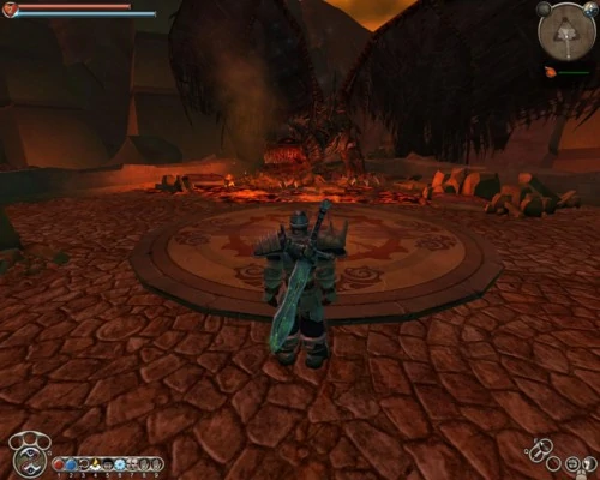
Later you are being trained in weapons and magic, and you have a rival student that you must contend with. This student reappears later in the game, and your choices in how you deal with her ultimately effect whether you can resist the final evil dragon that the game throws at you. This game did not have a profound effect on me. I think the main issue I had with it, is that it made the good and evil choices so obvious. In the Windwalker, I stumbled into my bad deed, and had to work my way out of it, but in Fable it is presented to you on a virtual platter.
Sagebrush
Sagebrush is a more recent game that would fall into the “retro 3D” aesthetic genre. It is a short but powerful experience that takes the player on a journey through a cult compound. Memories and messages from the victims provide the story as the player uncovers the horrible events that occurred there.
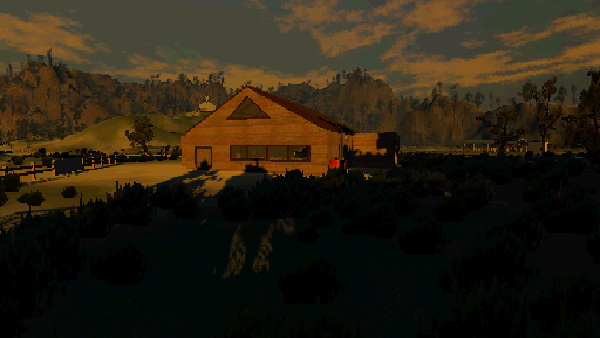
The idea of a religious leader, given trust and authority over his followers, then abusing that trust for his own base desires, is presented in an indirect, but poignant way in Sagebrush. It's a story that has become far too common in our world, and was also touched upon in Ultima V. What happens when the moral authority becomes corrupted? Were they ever even moral to begin with?
I won't attempt to answer these questions right now ... but I would recommend this game if you are interested in the topic.
Undertale
Often brought up in conversations on this topic, Undertale seems to be one of the more influential recent games that deal with morality in a unique way. I have not actually played Undertale, but I asked a gamedev friend of mine (Nightblade at deengames.com) to explain some of the game's mechanics to me.
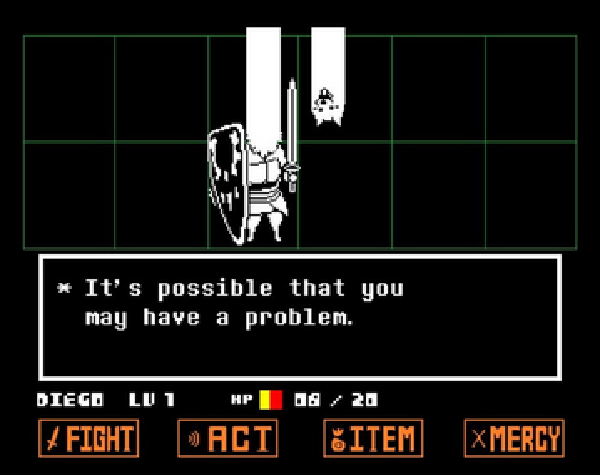
The premise of Undertale is built on choosing whether or not to kill monsters verses other non-lethal options in a given confrontation. This affects the game's difficulty - the peaceful path is much more difficult - and also in-game events, choices, and endings; there's a fair chunk of content locked behind the two passive ways through the game.
With good (passive/non-agressive) actions, you can unlock content and character plot and backdrop for the main game characters. With evil actions (killing monsters), you can more easily level up and get stronger.
Nightblade also stated “The game influenced me as a game developer, certainly. This wasn't just a weak 'oh yeah kill or don't kill, same thing.' You get more content/backstory for being passive, and critically, the passive way through the game - figuring out which actions and in which order to work on each monster and boss - provide a really interesting and mechanically fun way of going through the game without combat. It's really interesting.”
By incentivizing a non-violent approach through additional content, while at the same time making the violent way easier, it seems players are really given a kind of personal, moral choice when they play Undertale.
InFamous
Another friend (Ty Brannan from InTheKeep.com) shared some thoughts about the game InFamous...
In InFamous, players are presented with several choices which ultimately decide if they are good or evil using the game's Karma System. The main character, Cole, starts off as neutral, allowing the player to choose their alignment through actions and choices. One example of this is whether to help injured citizens, or to drain their health in order to restore your own.
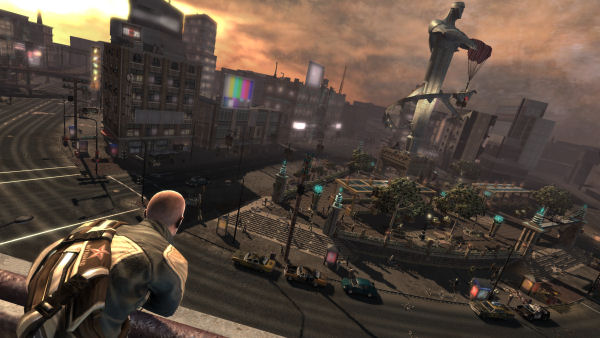
The Karma level will determine whether you ascend to the rank of hero, or descend to that of Infamous. These ranks will also determine the powers you get to use.
Through story missions, side missions and certain events called Karma moments, they player is allowed to develop their powers, whether toward good or evil. These states are not the same though, Coles appearance will change, and townsfolk will react differently, either running to you for help, or rejecting you and throwing stones.
He concluded with: “Even as an adult, I find it very difficult to be the bad guy, even as a character in a video game or TTRPG. I remember watching my friends play InFamous and being fascinated by those who were comfortable intentionally choosing the dark path. It served as an interesting social experiment and opened my eyes to the fact that I am definitely not like everyone else around me, even those I call friends. 😉”
A Warning
Another friend of mine, who goes by Hakuoro, has advised me with a warning after I mentioned I wanted to incorporate religious ideas and morality into my own game (see the last section below for more info). He linked an article by Robert Ingersoll, written in 1888 called Art and Morality. One might not expect to find anything of relevance to this topic written that far back in time, but ideas do tend to have more permanence than the media to which they may pertain. The main takeaway from this article, as he sees it, is "The artist who endeavors to enforce a lesson, becomes a preacher; and the artist who tries by hint and suggestion to enforce the immoral, becomes a pander."
In terms of game design, is it really even possible to create a compelling system of morality? By incorporating any kind of reward or punishment within the gameplay, would that not make the moral choice simply a pragmatic one?
I think this is a great question. I don't know if I have an easy answer to it. I tend to think that an effective morality system would have to be subtle enough for the player to perhaps not actually notice it. It might quietly take account of the player's actions without actually confronting them. Only later, perhaps after the completion of the game's story, would players be shown what they did and the consequences would become manifest. I definitely have to think about this more.
Conclusion
In conclusion, we have a very incomplete list of games that have endeavored to incorporate the ideas of religious belief, morality and ethical choices into their gameplay, in one way or another. These are games I have played, or friends of mine have played, which provided a unique perspective. I feel like these games caused me to really reflect on reality and the nature of morality, more-so than books or movies, as it was up to me to make the ethical, or not so ethical, choices and live with the consequences.
I am not the first person to ask whether games can be used as a way to teach concepts of right and wrong, and I won't be the last. I think we are really only scratching the surface as far as what is possible. The landscape of games and those who play them is changing and evolving. Games are not just coin eating machines in an arcade anymore, although thanks to microtransactions and games as a service this tradition is also thriving in many terrible new ways. Games are personal, games are art, games are expression and games can teach us about our beliefs and our choices in ways that other media have not been able to do.
In some ways the critics of games are right. They can be addictive, they can glorify violence, and they can be used to promote weird or harmful ideologies. But just as with any tool, while they can be used for evil, their unique power can also be harnessed to serve goodness, mercy and kindness. They can be used to teach critical thinking, morality and even spiritual ideals.
The Part Where I Say – Oh, By the Way, I am Also Working on a Game...
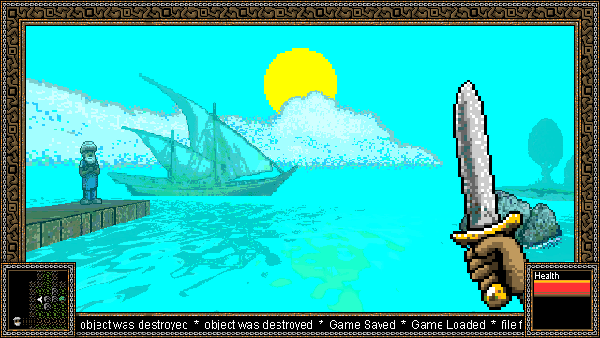
Islands of the Caliph
Islands of the Caliph is my own game. Visually, it is inspired by the dungeon crawlers and early RPGs I played in the 1980s like Might & Magic and Bards Tale, but it also incorporates real-time combat and other features that make it a different kind of experience.
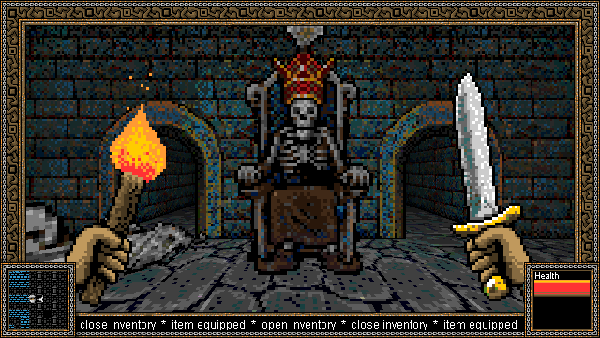
The story and setting draw on Middle Eastern folklore and spiritual traditions. I am currently trying to decide how to approach the idea of moral choices in the game. Part of me wants to do something similar to Moebius, where immoral actions can directly and adversely effect your character. While another part of me wants to keep the gameplay fairly simple, while still drawing upon the lore of the Middle East, Islam and other Abrahamic faiths. This article is an attempt to delve into the possible ways to approach this aspect of the game, and help me to choose a course of action going forward.
I am about halfway through the game's content, adding new game mechanics here and there when they seem appropriate. I would love to be able to capture that open world experience provided by games like Might & Magic, while challenging the player's understanding of right and wrong, as well as conveying knowledge of a spiritual tradition that is often misunderstood and maligned.
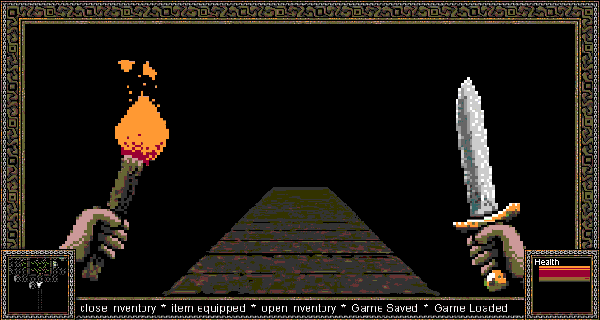
Finding a new and compelling way to introduce the concepts of morality, ethics and spirituality is a tough challenge. I think I may have underestimated how much, but I plan to figure something out and hopefully it will be received in a positive light.

Devlog #3: Night Map and Stormtroopers
Tactics of World War OneA short insight into the development of Tactics of World War One, a real-time tactics game. In this devlog I want to show you the latest map and improvements...

Devlog #2: UI and New Class
Tactics of World War One 2 commentsA short insight into the development of Tactics of World War I, a real-time tactics game. This time I want to show you the game's unique UI and the latest...

Islands of the Caliph
Islands of the CaliphIslands of the Caliph is a new game that is inspired by old RPGs from the 1980s, which draws from Middle Eastern folklore and religion.

New Generation
Yume RPG Builder 1 commentThe end of the old and the birth of a new one. The development of the next-gen YRPG Game-Core has begun.

Islands of the Caliph
Role PlayingIslands of the Caliph is an old-school RPG with grid based movement set in a fictional island civilization. Thematically it draws on Middle Eastern folklore...

Tactics of World War One
Real Time TacticsTactics of World War One is a real-time tactics game that puts you in the role of a military leader in World War One, requiring you to make smart tactical...

Scheherazade's Journey
PlatformerScheherazade's Journey is a 3D-Puzzle-Platformer. You are Scheherazade, the legendary heroine from One Thousand and One Nights, who tries to return to...

Paradox Vector
First Person ShooterExplore a series of impossible, cyclopean mazes and fight ancient alien beings in this retro first-person shooter. Paradox Vector is inspired by the old-school...

Return Of The Gecko
PlatformerI think many fans of Gex game series waiting for fourth part of the game. Return Of The Gecko- based on Gex game series, all rights reserved Crystal Dynamics...

Lotter vs The World
RoguelikeMillions of cycles ago, the subroutines of Acknex lived together in harmony. Working to create games and aid new developers on their path... But then...the...

Rigid Force Alpha
ArcadeJump into the pilot’s seat of the Rigid Force Alpha fighter and blast off to take down hordes of infected aliens and dreadful machines programmed on...

Lotter vs The World Vol.2
First Person ShooterYou, Star Lotti, find the USS Patchnotes floating in space sending a distress signal. You decide to help the USS Patchnotes and enter their ship. This...

Dungeon Deities
Role PlayingDungeon Deities is part Browser-game, part realtime Dungeon Crawler. Players traverse the Dungeons of other players, carefully avoiding traps and battling...

















Art officaial inteligece